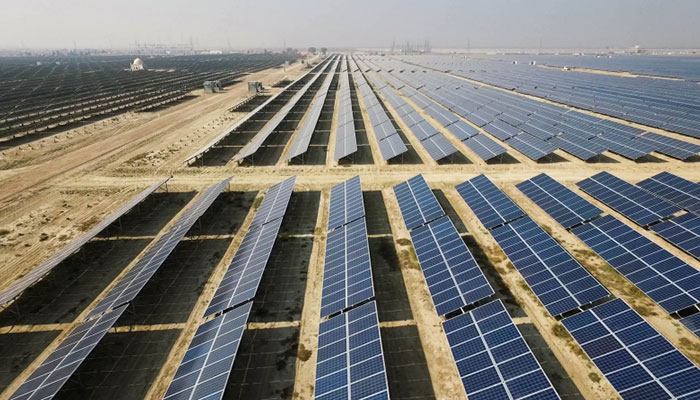Pakistan at bottom among countries striving for secure energy future
LAHORE: At a juncture when most countries on the world map are sharing their experiences on auspicious global platforms to find ways and facilitate the process of shifting from fossil-based systems like oil, natural gas and coal to renewable sources like wind, solar and lithium-ion batteries etc, the incumbent Pakistani regime in Islamabad is hell-bent upon blaming its political foes for energy shortages, soaring electricity tariffs and the surging circular debt.
According to the Geneva-based World Economic Forum, the increasing penetration of renewable energy into the energy supply mix, the onset of electrification and improvements in energy storage are all key drivers of the energy transition.
The key findings from the World Economic Forum’s Energy Transition Index 2021 reveal that Pakistan is ranked 104th among 115 nations striving for energy transition in a bid to ensure a secure, sustainable, affordable, and reliable energy future amid the crises generated by the COVID-19 pandemic.
Denmark, Finland and the United Kingdom are among the top 10 countries that are improving their energy system performance and sustainability outcomes by putting in place stable regulatory environments, diversified energy mix and cost-reflective energy pricing methodologies.
Moreover, countries with rising energy demand, such as China, India and Sub-Saharan African nations, have registered the largest gains but their scores on the latest Energy Transition Index remain low in absolute terms.
India rests at 87th position, while China occupies the 68th position. Here follows a list of 50 top-ranking nations in this context: Sweden, Norway, Denmark, Switzerland, Austria, Finland, United Kingdom, New Zealand, France, Iceland, Netherlands, Latvia, Uruguay, Ireland, Lithuania, Estonia, Spain, Germany, Portugal, Belgium, Singapore, Canada, Croatia, United States, Albania, Costa Rica, Italy, Israel, Colombia, Brazil, Slovenia, Hungary, Georgia, Chile, Australia, Paraguay, Japan, Romania, Malaysia, Luxembourg, Malta, Peru, Slovak Republic, Azerbaijan, Czech Republic, Mexico, Argentina, Ecuador, Korea and Panama.
Here follows some more salient features of the 50-year-old World Economic Forum’s Energy Transition Index 2021: “The scaling of nascent technologies and an increased focus on climate change has fixed global attention firmly on the decarbonisation of energy systems.
This journey is far from over. As of 2018, 81% of the world’s energy was still supplied by fossil fuels, the global greenhouse gas emissions rose through 2019 and more than 770 million people around the world still lack access to electricity”.
-
 China: Stunning Drone Show Lights Up Night Sky Ahead Of Spring Festival 2026
China: Stunning Drone Show Lights Up Night Sky Ahead Of Spring Festival 2026 -
 Andrew's Epstein Scandal: Will King Charles Abdicate Following King Edward's Footsteps?
Andrew's Epstein Scandal: Will King Charles Abdicate Following King Edward's Footsteps? -
 Billy Joel Leaves Loved Ones Worried With His 'dangerous' Comeback
Billy Joel Leaves Loved Ones Worried With His 'dangerous' Comeback -
 Prince William Dodges Humiliating Question In Saudi Arabia
Prince William Dodges Humiliating Question In Saudi Arabia -
 Dax Shepard Describes 'peaceful' Feeling During Near-fatal Crash
Dax Shepard Describes 'peaceful' Feeling During Near-fatal Crash -
 Steve Martin Says THIS Film Has His Most Funny Scene
Steve Martin Says THIS Film Has His Most Funny Scene -
 Kensington Palace Shares Update As Prince William Continues Saudi Arabia Visit
Kensington Palace Shares Update As Prince William Continues Saudi Arabia Visit -
 Fugitive Crypto Scammer Jailed For 20 Years In $73m Global Fraud
Fugitive Crypto Scammer Jailed For 20 Years In $73m Global Fraud -
 Will Andrew Mountbatten-Windsor Finally Go To Jail Now That King Charles Has Spoken Out? Expert Answers
Will Andrew Mountbatten-Windsor Finally Go To Jail Now That King Charles Has Spoken Out? Expert Answers -
 Melissa McCarthy Reveals Her Tried And Tested ‘corpse’ Night Time Routine That’s Lost Her 95lbs
Melissa McCarthy Reveals Her Tried And Tested ‘corpse’ Night Time Routine That’s Lost Her 95lbs -
 Horrifying Pictures Of The Kidnapper Of Savannah Guthrie's Mother Released
Horrifying Pictures Of The Kidnapper Of Savannah Guthrie's Mother Released -
 Andrew's Ex-girlfriend Launches Brazen Attack On Epstein Victims On Piers Morgan Show
Andrew's Ex-girlfriend Launches Brazen Attack On Epstein Victims On Piers Morgan Show -
 Andrew Mountbatten-Windsor 'on His Own' As Palace Gives Green Light To Law Enforcement
Andrew Mountbatten-Windsor 'on His Own' As Palace Gives Green Light To Law Enforcement -
 Kanye West's Tweet About Super Bowl Halftime Resurfaced After Bad Bunny's Show
Kanye West's Tweet About Super Bowl Halftime Resurfaced After Bad Bunny's Show -
 'FBI' Star Juliana Aidén Martinez Tease Her Return To 'Law And Order: SVU' After Quitting
'FBI' Star Juliana Aidén Martinez Tease Her Return To 'Law And Order: SVU' After Quitting -
 Cardi B's Emotional Words To Pal Amid Stefon Diggs Rumored Breakup Revealed
Cardi B's Emotional Words To Pal Amid Stefon Diggs Rumored Breakup Revealed




